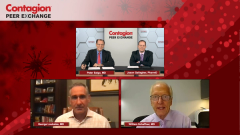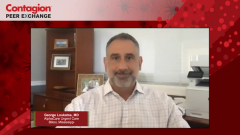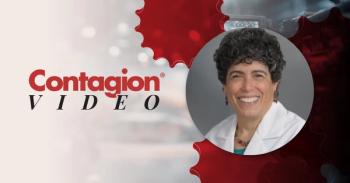
Upcoming Flu Season 2021-2022
Panel speculates on the upcoming flu season for 2021-2022.
Episodes in this series

Transcript:
Peter Salgo, MD: Perhaps there’s another unintended consequence of the good flu season that we had before. People didn’t get the flu, which meant that there’s not a lot of—for lack of a better word—autologous immunity out there. They didn’t get the flu, they’re not immune to the flu, and they weren’t exposed to the flu. Does that set us up in an unfortunate way for 2021-2022, Bill?
William Schaffner, MD: We’re in a scientifically gray area. People don’t know. We’ll have to wait and see what happens. I’m just going to say we don’t know. Let’s wait and see. Maybe my colleagues have a more definitive opinion about that.
Peter Salgo, MD: We can probably go on the record with something here.
William Schaffner, MD: Flu is fickle. I hesitate to predict.
Peter Salgo, MD: Jason, do you want to predict?
Jason Gallagher, PharmD: No.
Peter Salgo, MD: Thanks so much. We bring you guys here to go out on a limb.
Jason Gallagher, PharmD: It was a hot potato question and it fell on Bill’s lap. It’s totally novel. We have not been in this situation before. It’s hard to wrap your mind around just how absent a flu season we had because flu testing went down—something like 20%—but the incidence of positive tests went down 99%. It was crazy. It was like it didn’t exist. We had like 5 cases at our hospital.
Peter Salgo, MD: That’s a number I hadn’t heard before. Let’s emphasize this: The positive-tested cases went down 99%.
Jason Gallagher, PharmD: Yes. It was an absent season. How do you predict the next one?
Peter Salgo, MD: That’s crazy. Which comes back to one thing I was hammering on earlier: Basic public health—not vaccines, and not high-tech medicine. Basic public health, masks, distancing, watching your travel, and washing your hands works, right?
William Schaffner, MD: It does. The opposite side of that coin is also true. As we have opened up and taken off our masks—at least we did at the beginning of the summer—it’s interesting. Respiratory viral infections have gone up, particularly respiratory syncytial virus [RSV] in the Southeast. Other common cold viruses have increased. Not seasonally, but given the opportunity to spread, they’re doing that.
Peter Salgo, MD: Here’s some personal experience, unpublished data, Salgo et al. Last spring, one of my children had a sniffle. Next thing I knew, the whole house was sniffling and coughing, then we all got tested for COVID-19, and we were all negative. It was some sort of cold or something. In other years, nobody would have thought twice about it. “Oh, you’ve got a sniffle.” Everybody battened down the hatches, stayed home, and isolated until we were sure there was no risk to the population at large. I guess that’s happening everywhere. Is that what you see?
Jason Gallagher, PharmD: Yes, this also happened in the Gallagher household. Not even a preprint, but the unvaccinated kid gets a sniffle, we have her tested, and it’s negative. The rest of us get the same thing. How can you know?
Peter Salgo, MD: It’s happening everywhere. George, in retrospect, it was shocking that we’d gone through a whole year without it. This is something that happens all the time, right?
George Loukatos, MD: As a clinician, it has turned things upside down for us. Because we saw a spike in RSV in June and July, where under normal circumstances, I wouldn’t even be testing for RSV. I’d say, “You’re wasting my tests. Why are you testing somebody for RSV in July?” But we had a huge spike in it, and waiting for those flu tests to turn positive all last year and never having them—it got to the point where we were questioning if this was a false positive result. The positives were so few and far between that we were wondering if this was falling into a false positive area. In some ways, that makes testing more important now because we don’t know what’s coming around the corner to us and we’re figuring it out as we go.
Peter Salgo, MD: Something you just said struck me as important. I’m sure it’s not the first time someone has said that to you. But you’re getting RSV off-season. By all the public health measures that we’ve instituted, have we messed up our expectations for what season, what virus, and when it happens? What does that mean about the biology we used to invoke about when RSV comes and all that stuff?
William Schaffner, MD: We’re waiting to see whether the old normal will reassert itself. This is watching as we go. As we were saying before, flu is fickle. I would hesitate to predict how severe the season is going to be. We’re going to have to watch and test. We’ll be doing a lot of testing this fall as the respiratory viruses kick up and COVID-19 is still among us.
Peter Salgo, MD: Flu is fickle, huh? For those of us of a certain era, it reminds me of, it’s the flying fickle finger of flu.
I want to thank all of you out there for watching this Contagion® Peer Exchange. If you enjoyed the content, please subscribe for our e-newsletters to receive upcoming Peer Exchange segments and other great content right in your in-box.
Transcript edited for clarity.
Newsletter
Stay ahead of emerging infectious disease threats with expert insights and breaking research. Subscribe now to get updates delivered straight to your inbox.


































































































































